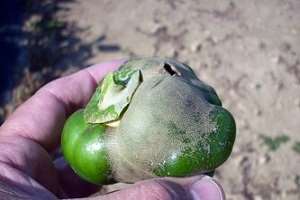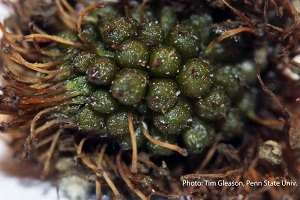Broad mites are being observed more frequently on a variety of vegetable crops in the field, high tunnel, and greenhouse.

Broad mites are very tiny and range in size from .1 mm to .3 mm in length. They can move through the plant canopy by crawling, but they will also hitch-hike on winged insects like white fly and aphids. Broad mites can attack over 60 families of plants, including vegetable stalwarts like beet, beans, cucumber, eggplant, pepper, potato, and tomato. As the broad mite feeds it releases a toxin that has growth regulator effects on plant tissues. Very low densities of this pest can cause significant plant and fruit injury.
Symptoms of broad mite infestations can include leaf distortion, shortening of internodes, leaf discoloration, leaf blistering and shriveling, fruit russeting, fruit deformity, and fruit splitting. Damage from broad mites can continue to appear in the field, high tunnel, or greenhouse for several weeks after this pest has been controlled because of the growth regulating effects of the broad mite toxin.

Broad mite management is made more complex because of their relatively small size and the availability of miticides with unique MOAs that effectively target this pest. Growers have been encouraged to rotate products with different modes of action to delay resistance. Unfortunately, the available miticides/insecticide arsenal continues to shrink and products with new modes of action are not entering the market with any regularity. As a result, many growers are moving as fast as they can towards the implementation of biocontrol agents in their operations to combat broad mites and other pests.
The transition from managing pests with chemical miticides or insecticides to using biocontrols exclusively is difficult at best. Most growers have a rescue mentality in respect to pests so implementing biocontrols proactively may require a completely new skill set.
In an effort to equip our growers and farmers with the knowledge and skill to employ biocontrol agents in the field and greenhouse successfully Penn State Extension will be holding a 2-day Advanced Biocontrol School on November 3rd and November 4th at the Lancaster Farm and Home Center in Lancaster, PA. This year's program features an exciting array of topics presented by leading University researchers and bio-control practitioners from across the USA and Canada.
This year we are offering the traditional 2-day face-to-face conference and trade show at the Lancaster Farm and Home Center and a virtual live streaming option that affords you the opportunity to catch every session live from the comfort of your own office or living room via live conference streaming.
All program registrants will also be given a code that will allow them unlimited access to the conference recordings from our Penn State website in early January.
Source: psu.edu